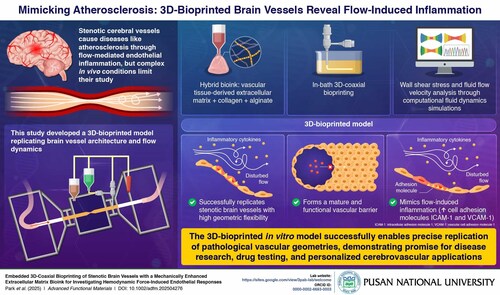Traditional in vitro models often fall short of replicating the structural, mechanical, and biological complexity of the human cerebrovascular environment. This highlights the need for more physiologically relevant models to study how abnormal flow patterns drive endothelial dysfunction and inflammation.
To bridge this gap, a collaborative team led by Professor Byoung Soo Kim and Researcher Min-Ju Choi from Pusan National University, along with Professor Dong-Woo Cho and Dr. Wonbin Park from Pohang University of Science and Technology (POSTECH), developed a 3D-bioprinted in vitro model of stenotic brain blood vessels. Their study was published online in the Advanced Functional Materials journal on June 24, 2025.

